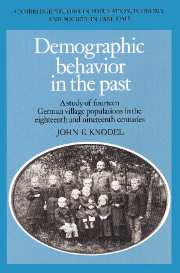 Demographic Behavior in the Past
Demographic Behavior in the Past Book contents
- Frontmatter
- Contents
- List of tables
- List of figures
- Acknowledgements
- PART I INTRODUCTION
- PART II MORTALITY
- PART III FAMILY FORMATION
- PART IV MARITAL REPRODUCTION
- PART V INTERRELATIONSHIPS IN DEMOGRAPHIC BEHAVIOR
- PART VI CONCLUSION
- Appendices
- A Selection of couples for analysis
- B Assessment of the quality of demographic data contained in German village genealogies
- C Local village conditions
- D The occupational and status classification schemes
- E Calculation of infant and child mortality risks
- F Prevailing infant-feeding patterns
- G Evidence of biases in the determination of legitimization status
- Bibliography
- Index
G - Evidence of biases in the determination of legitimization status
Published online by Cambridge University Press: 04 August 2010
- Frontmatter
- Contents
- List of tables
- List of figures
- Acknowledgements
- PART I INTRODUCTION
- PART II MORTALITY
- PART III FAMILY FORMATION
- PART IV MARITAL REPRODUCTION
- PART V INTERRELATIONSHIPS IN DEMOGRAPHIC BEHAVIOR
- PART VI CONCLUSION
- Appendices
- A Selection of couples for analysis
- B Assessment of the quality of demographic data contained in German village genealogies
- C Local village conditions
- D The occupational and status classification schemes
- E Calculation of infant and child mortality risks
- F Prevailing infant-feeding patterns
- G Evidence of biases in the determination of legitimization status
- Bibliography
- Index
Summary
The number of births born out of wedlock that were eventually followed by the marriage of the parents, and hence should be classified as legitimate according to the definition used in the present study, is probably biased downward due to two problems. First, some mothers of illegitimate births might marry the father outside the village and hence not have the marriage recorded in the parish registers on which the village genealogy is based. Second, during periods when the name of the father of the illegitimate child is not given in the parish register, the genealogist might not know that the father was the eventual husband of the child's mother, especially if the child died before the marriage or no further mention of the child is found in the parish registers subsequent to the parents' marriage.
The possibility that a number of subsequent marriages of unwed parents could have taken place outside the village is suggested by the fact that a substantial proportion of unwed mothers whose child appears as non-legitimized in the genealogy did not remain permanently in the village where the birth occurred and thus did not remain under observation as far as the local records were concerned. While the departure of someone from the village is only occasionally noted explicitly in the village genealogies, it can be inferred from the lack of a death date or from a mention of the death occurring elsewhere.
- Type
- Chapter
- Information
- Demographic Behavior in the PastA Study of Fourteen German Village Populations in the Eighteenth and Nineteenth Centuries, pp. 550 - 556Publisher: Cambridge University PressPrint publication year: 1988


